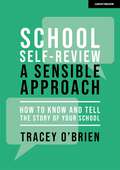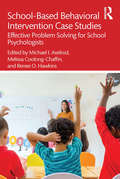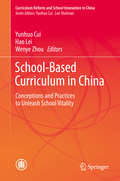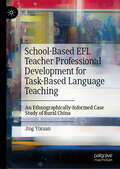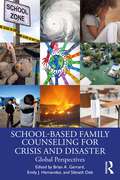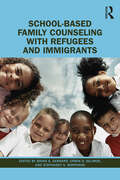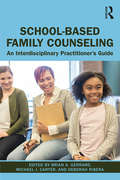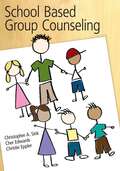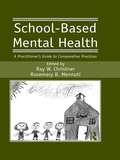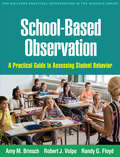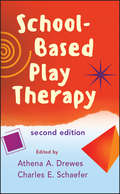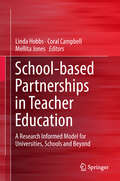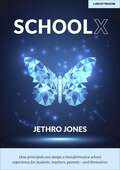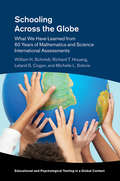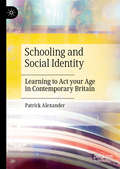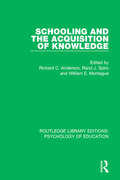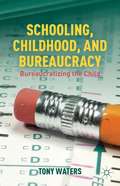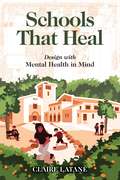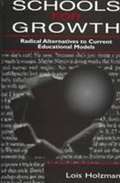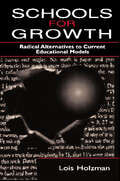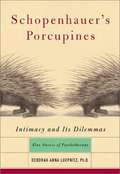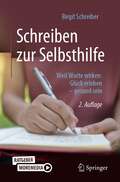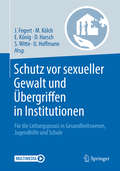- Table View
- List View
School self-review – a sensible approach: How to know and tell the story of your school
by Tracey O'BrienThis book looks at the sensible and meaningful role of self-review in creating sustainable improvement in all areas across secondary schools. It outlines a self-review approach focussed on key principles which ensure this approach is transparent, purposeful, does not negatively impact on workload, that does not use the same approach for all teams and that does actually result in clear ideas for school improvement. It discusses claims of effective self-review including that it challenges thinking, leads to improvement, incorporates a range of stakeholders, skills people up, and helps build professional communities.The book is full of examples and case studies so that the reader can transfer some of these ideas to their context, discuss them at meetings and help generate new ideas. It challenges the 'deep dive' approach as something that should be left to Ofsted and instead suggests that leaders should know daily what is happening in their schools, and instead work with staff to design self-review activities that are bespoke and fit for purpose.The main theme is around 'improve not prove', where stakeholders feel involved, valued and empowered to be change-makers at a range of scales. It examines how effective self-review can reduce workload and support improvements in wellbeing.
School-Based Behavioral Intervention Case Studies: Effective Problem Solving for School Psychologists
by Michael I. Axelrod Melissa Coolong-Chaffin Renee O. HawkinsSchool-Based Behavioral Intervention Case Studies translates principles of behavior into best practices for school psychologists, teachers, and other educational professionals, both in training and in practice. Using detailed case studies illustrating evidence-based interventions, each chapter describes all the necessary elements of effective behavior intervention plans including rich descriptions of target behaviors, detailed intervention protocols, data collection and analysis methods, and tips for ensuring social acceptability and treatment integrity. Addressing a wide array of common behavior problems, this unique and invaluable resource offers real-world examples of intervention and assessment strategies.
School-Based Curriculum in China: Conceptions and Practices to Unleash School Vitality (Curriculum Reform and School Innovation in China)
by Yunhuo Cui Hao Lei Wenye ZhouThis book first develops a framework to understand the curriculum administration system in China. It describes the historical process of localizing school-based curricula as well as the significance and positioning of school-based curricula, and presents in detail cases of how three types of school-based curriculum were developed and implemented in Chinese schools.The book outlines for the first time best practices in school-based curriculum development in China, i.e. how to make a holistic curriculum plan, how to design a curriculum, and how to develop a course in the context of a school-based curriculum. By discussing these three aspects, it clearly summarizes the strategies and technologies for school-based curriculum development, which are applicable across contexts.Although the concept originated outside China, school-based curriculum development in China differs from that in other countries both in theory and practice. This book equips readers with theoretical and practical knowledge of how to develop school-based curricula and how to generate experiences for new curriculum development.This timely book is a valuable resource for researchers, curriculum designers, school teachers and others who are interested in school-based curriculum development.
School-Based EFL Teacher Professional Development for Task-Based Language Teaching: An Ethnographically-Informed Case Study of Rural China
by Jing YixuanThis book investigates the efficacy of a teacher educator collaborating with rural Chinese teachers of English to activate agentic adoption of task-based language teaching (TBLT). Set in rural northwestern China, the book traces the researcher's role as a participant-observer, during which she conducted a 12-week immersive study in a rural secondary school. The initial approach focused on understanding and trust-building, followed by the development of a collaborative partnership with teachers, and results demonstrate that given appropriate guidance and assistance, rural Chinese teachers successfully incorporated tasks into their classrooms to encourage increased motivation for learning and communicating in English. This book will be of interest to students and scholars of applied linguistics, language education, and TESOL, and the author demonstrates that true teacher educators are more effective as learning partners to teachers than simply a coach or lecturer.
School-Based Family Counseling for Crisis and Disaster: Global Perspectives
by Sibnath Deb Brian A. Gerrard Emily J. HernandezSchool-Based Family Counseling for Crisis and Disaster is a practical handbook with a school-based family counseling and interdisciplinary mental health practitioner focus that can be used to mitigate crises and disasters that affect school children. Anchored in the school-based family counseling (SBFC) tradition of integrating family and school mental health interventions, this book introduces interventions according to the five core SBFC metamodel areas: school intervention, school prevention, family intervention, family prevention, and community intervention. The book has an explicit "how to" approach and covers prevention strategies that build student, school, and family resilience for handling stress and interventions that can be provided during and immediately after a disaster or crisis has occurred. The chapter authors of this edited volume are all experienced professors and/or practitioners in counseling, psychology, social work, marriage and family therapy, teaching, and educational administration. All mental health professionals, especially school-based professionals, will find this book an indispensable resource for crisis planning and developing a trauma-sensitive school.
School-Based Family Counseling with Refugees and Immigrants
by Brian A. Gerrard Erwin D. Selimos Stephaney S. MorrisonSchool-Based Family Counseling with Refugees and Immigrants focuses on the practical application of School-Based Family Counseling (SBFC) with refugee and immigrant populations. Emphasizing collaboration, mutual assistance, dialogue, and joint problem-solving, SBFC takes a systems approach that stresses the integration of school, family, and community interventions; the three most important systems that affect the lives of children. Through case studies, the book explains how to design and implement integrated SBFC interventions for refugee and immigrant populations in an explicit manner. The book’s practical, how-to approach is suitable for novice and experienced practitioners alike.
School-Based Family Counseling: An Interdisciplinary Practitioner's Guide
by Brian A. Gerrard Michael J. Carter Deborah RiberaWritten by experts in the field, School-Based Family Counseling: An Interdisciplinary Practitioner’s Guide focuses on how to make integrated School-Based Family Counseling (SBFC) interventions, with a focus on integrating schools and family interventions, in an explicit step-by-step manner. Departing from the general language used in most texts to discuss a technique, this guide’s concrete yet user-friendly chapters are structured using the SBFC meta-model as an organizing framework, covering background information, procedure, evidence-based support, multicultural counseling considerations, challenges and solutions, and resources. Written in discipline-neutral language, this text benefits a wide variety of mental health professionals looking to implement SBFC in their work with children, such as school counselors and social workers, school psychologists, family therapists, and psychiatrists. The book is accompanied by online video resources with lectures and simulations illustrating how to implement specific SBFC interventions. A decision tree is included to guide intervention.
School-Based Group Counseling
by Christopher A. Sink Cher N. EdwardsExtremely relevant, comprehensive, and 'hands on', SCHOOL BASED GROUP COUNSELING guides readers through the process of developing, running, and evaluating quality small groups in K-12 school settings. Specifically focused on the school counseling profession, it provides an excellent context for group work through a discussion of the pertinent theories and key research. Its real-world emphasis includes K-12 case studies and group examples from practicing school counselors. The authors use the lens of real-world school-based practice, strengths-based counseling, systems thinking, developmental psychology, and ASCA's National Model--resulting in a professional, comprehensive, and well-balanced group counseling text for K-12 preservice school counselors.
School-Based Mental Health: A Practitioner's Guide to Comparative Practices
by Ray W. Christner Rosemary B. MennutiThis volume provides school-based practitioners with a comprehensive and comparative guide to the strategic interventions, therapeutic modalities, and treatment approaches that are most commonly and effectively used in educational settings. Three main sections of the text present a foundation of universal interventions, targeted interventions, and alternative interventions appropriate for use in schools. Unifying the chapters are two central case examples, allowing the reader to see and evaluate the strengths and potential challenges of each technique in a familiar situation. This emphasis on case examples and the comparative structure of the volume will provide a level of hands-on and practical learning that is helpful for both students and mental health practitioners working in schools for the first time, and as a resource for more seasoned professionals who need to expand the tools at their disposal.
School-Based Observation: A Practical Guide to Assessing Student Behavior
by Amy M. Briesch Robert J. Volpe Randy G. FloydWidely used to assess social–emotional and behavioral referral concerns in grades PreK–12, systematic direct observation is an essential skill for school psychologists and other educators. This accessible book helps practitioners conduct reliable, accurate observations using the best available tools. Chapters present effective coding systems for assessing student classroom behavior, the classroom environment, behavior in non-classroom settings, and behavior in a functional assessment context; also provided are guidelines for developing new codes when an appropriate one does not already exist. Procedures for summarizing, graphing, and interpreting data for different assessment purposes are detailed. In a large-size format with lay-flat binding for easy photocopying, the book includes 13 reproducible coding forms. Purchasers get access to a Web page where they can download and print the reproducible materials. This book is in The Guilford Practical Intervention in the Schools Series, edited by T. Chris Riley-Tillman.
School-Based Play Therapy
by Charles E. Schaefer Athena A. DrewesA thorough revision of the essential guide to using play therapy in schoolsFully updated and revised, School-Based Play Therapy, Second Edition presents an A-to-Z guide for using play therapy in preschool and elementary school settings. Coedited by noted experts in the field, Athena Drewes and Charles Schaefer, the Second Edition offers school counselors, psychologists, social workers, and teachers the latest techniques in developing creative approaches to utilize the therapeutic powers of play in schools.The Second Edition includes coverage on how to implement a play therapy program in school settings; play-based prevention programs; individual play therapy approaches as well as group play; and play therapy with special populations, such as selectively mute, homeless, and autistic children. In addition, nine new chapters have been added with new material covering:Cognitive-behavioral play therapyTrauma-focused group workTraining teachers to use play therapyFilled with illustrative case studies and ready-to-use practical techniques and suggestions, School-Based Play Therapy, Second Edition is an essential resource for all mental health professionals working in schools.
School-based Partnerships in Teacher Education: A Research Informed Model For Universities, Schools And Beyond
by Coral Campbell Mellita Jones Linda HobbsThis book demonstrates school-based approaches to primary science teacher education. The models used involve partnerships between universities and primary schools to engage pre-service primary teachers in classroom teaching and learning that effectively connects theory with practice separate to the formal practicum arrangements. The book is a culmination of the research and collaboration of researchers from five Australian universities involved in the Science Teacher Education Partnerships with Schools (STEPS) project, funded by the Australian Government Office for Learning and Teaching.While the STEPS project focused on partnerships in primary science teacher education, a key strength of the partnership model (the STEPS Interpretive Framework) developed and explored in this book is its applicability for cross-case, national, international, and inter-state analyses of partnership practices. This is shown through a number of case studies where the STEPS Interpretive Framework is applied and evaluated in the context of other school- or learning-related partnerships. These broad-ranging analyses illustrate the relevance of the model to a range of settings, both within and outside of education.
SchoolX: How principals can design a transformative school experience for students, teachers, parents – and themselves
by Jethro JonesHow can we transform the school experience for all stakeholders? Jethro Jones has the answer: design thinking. SchoolX shows principals how to become designers, not just managers or leaders. It introduces readers to the design-thinking process, an iterative and innovative way to approach the challenges the school leader faces. Drawing on the wisdom of the dozens of leaders he has interviewed for his Transformative Principal podcast, Jones shows principals how to put themselves in the shoes of the people in their school communities, using that empathy to drive radical change. But, crucially, Jones argues that it is only once leaders improve their own experience that they can transform the experiences of others.
SchoolX: How principals can design a transformative school experience for students, teachers, parents – and themselves
by Jethro JonesHow can we transform the school experience for all stakeholders? Jethro Jones has the answer: design thinking. SchoolX shows principals how to become designers, not just managers or leaders. It introduces readers to the design-thinking process, an iterative and innovative way to approach the challenges the school leader faces. Drawing on the wisdom of the dozens of leaders he has interviewed for his Transformative Principal podcast, Jones shows principals how to put themselves in the shoes of the people in their school communities, using that empathy to drive radical change. But, crucially, Jones argues that it is only once leaders improve their own experience that they can transform the experiences of others.
Schooling Across the Globe: What We Have Learned from 60 Years of Mathematics and Science International Assessments
by William H. Schmidt Richard T. Houang Leland S. Cogan Michelle L. SolorioSchooling matters. The authors' professional pursuits for over twenty-five years have been focused on measuring one key aspect of schooling: the curriculum - what students are expected to study and what they spend their time studying. This documents their conviction that schools and schooling play a vital and defining role in what students know and are able to do with respect to mathematics and science. This research examines seventeen international studies of mathematics and science to provide a nuanced comparative education study. Whilst including multiple measures of students' family and home backgrounds, these studies measure the substance of the curriculum students study which has been shown to have a strong relationship with student performance. Such studies have demonstrated the interrelatedness of student background and curriculum. Student background influences their opportunities to learn and their achievements, yet their schooling can have even greater significance.
Schooling and Social Identity: Learning to Act your Age in Contemporary Britain
by Patrick AlexanderThis book examines the nature of age as an aspect of social identity and its relationship to experiences of formal education. Providing a new and critical approach to debates about age and social identity, the author explores why age remains such an important aspect of self-making in contemporary society. Through an ethnographic account of a secondary school in the south-east of England, the author poses three principal questions. Why are schools in English organised according to age? How do pupils and teachers learn to ‘act their age’ while at school? Ultimately, why does age remain such an important and complex organising concept for modern society? Cutting across lines of class and gender, this timely book will be of interest to students and scholars of self-making and identity in educational contexts, and others interested in how schooling socialises young people into categories of age as the foundational building blocks of modern society.
Schooling and the Acquisition of Knowledge (Routledge Library Editions: Psychology of Education)
by RICHARD C. ANDERSON, RAND J. SPIRO AND WILLIAM E. MONTAGUEOriginally published in 1977, this book reports the proceedings of a conference sponsored by the Navy Personnel Research and Development Center. The one common thread running through all of the formal papers and dialogue was that the knowledge a person already possesses is the principal determiner of what that individual can learn from an educational experience. These questions were addressed: How is knowledge organized? How does knowledge develop? How is knowledge retrieved and used? What instructional techniques promise to facilitate the acquisition of new knowledge? The kinds of answers provided are characterized by their as well as by their specificity. Accordingly, the volume should be of interest to both the generalist and the specialist.
Schooling, Childhood, and Bureaucracy
by Tony WatersIn exploring the relationship between bureaucratic schooling and the individual child, Waters describes the persistence of educational inequality, child development, and the nature of bureaucracy. The conclusions point out how education bureaucracies frame both schooling and childhood as they relentlessly seek to create ever more perfect children.
Schools That Heal: Design with Mental Health in Mind
by Claire LataneWhat would a school look like if it was designed with mental health in mind? Too many public schools look and feel like prisons, designed out of fear of vandalism and truancy. But we know that nurturing environments are better for learning. Access to nature, big classroom windows, and open campuses consistently reduce stress, anxiety, disorderly conduct, and crime, and improve academic performance. Backed by decades of research, Schools That Heal showcases clear and compelling ways—from furniture to classroom improvements to whole campus renovations—to make supportive learning environments for our children and teenagers. With invaluable advice for school administrators, public health experts, teachers, and parents Schools That Heal is a call to action and a practical resource to create nurturing and inspiring schools for all children.
Schools for Growth
by Lois HolzmanPresenting radical alternatives to current educational models. The author of this book donated an original digital copy for inclusion on Bookshare.org. Please join us in thanking Lois Holzman and the Eastside Institute for providing this accessible digital book to this community.
Schools for Growth: Radical Alternatives To Current Education Models
by Lois HolzmanA passionate deconstruction and reconstruction of learning, development, and schooling that urges teachers to explore and create new educational opportunities for themselves and their students, Schools for Growth: Radical Alternatives to Current Educational Models asks the following questions: Can we create ways for people to learn the kinds of things that are necessary for functional adaptation without stifling their capacity to continuously create their growth? Can schools become environments that support children to perform not only as learners but as developers of their lives? This book challenges educators to look at the deeply-rooted assumptions about schooling, learning, and development and urges that the way psychology and education have constructed our conceptions of what it means to teach, to learn, and to grow may be the most serious impediment to the learning and developing of children. Beyond the criticism, the author presents an original methodological reformation of what learning and development are as relational activities and then takes readers on a visit to three radical independent school settings. Arguing that current educational models have been misguided by scientific psychology, the author states that the dominant model of human development actually hinders development. Moreover, as learning theory has become infused with developmental theory over the past 30 years, the overly cognitive manner in which psychologists have come to think about thinking, learning, and development has become further insinuated into education. Both theories--learning and developmental--fail o recognize the human capacity for relational-revolutionary activity and for performance. The prevalent mode of education--acquisitional learning--is grounded in a world view that gives primacy to knowledge and knowing which Holzman believes is inconsistent with ongoing developmental activity. The author focuses on "developmental learning"--a social constructionist, activity-theoretic conception of development which includes a transformation and synthesis of Vygotsky and philosopher Ludwig Wittgenstein. She also discusses educational projects that are self-conscious attempts to break with key elements of modern epistemology and the dominant psychological paradigm as they are perpetrated in contemporary educational theory and practice. Their specific philosophies and practices highlight important methodological issues raised in the attempt to create "postmodern schools"--schools more concerned with growing than knowing.
Schopenhauer's Porcupines: Five Stories of Psychotherapy
by Deborah LuepnitzAre human beings destined to find perfect complements in love, or are we more like the fabled porcupines-forever jostling for a place between painful entanglement and loveless isolation? This is the question at the heart of this stunning new book. "People seek therapy only when things have gone terribly wrong in their lives," observes Deborah Luepnitz, one of the field's most gifted psychotherapists and a writer of uncommon talent. "They arrive in the grip of a death wish or some unspeakable obsession, but what is at stake always turns out to be intimacy-the endless dilemmas of loyalty and desire." Schopenhauer's Porcupines recounts five stories from Luepnitz's practice, with patients who range from the super-rich to the homeless-as they grapple with panic attacks, psychosomatic illness, marital despair, and sexual recklessness. We watch their therapy unfold week-to-week, from the first phone call to the final sessions, as these men and women learn, in the words of one poet, "to make room in love for hate."Written with wry humor and deep compassion, Schopenhauer's Porcupines goes further than any other book in unveiling the secrets of "how talking helps." Its wisdom and intelligence will appeal to readers everywhere who are reaching for psychological renewal and want to go beyond "quick-fix" cures.
Schreiben zur Selbsthilfe: Weil Worte wirken: Glück erleben – gesund sein
by Birgit SchreiberIn diesem Ratgeber erfahren Sie, wie Sie mit dem Schreiben das Glück im Alltag mehren und sich in Lebenskrisen selber helfen können. Die Methode erfordert keine Vorkenntnisse und ist für jeden erschwinglich. Die Anregungen sind wissenschaftlich fundiert und unterstützen Sie dabei, Ihre persönliche Entwicklung selbst in die Hand zu nehmen. Sie stärken Seele und Körper, beugen Burnout vor und trainieren kommunikative Kompetenzen. Menschen in Therapie und Beratung können Prozesse intensivieren. Wer noch keinen Therapeuten gefunden hat, kann die Wartezeit produktiv nutzen. Alle Anregungen eignen sich gut fürs Tagebuch und Journal. Hörübungen machen die Umsetzung leicht. Ein Begleiter, für alle, die gern schreiben, auch bei belastenden Erfahrungen. Aus dem Inhalt: Schreiben als Selbsthilfe – Grenzen: wann ist professionelle Hilfe wichtig – gut erforscht: amerikanische Schreibmethoden – neue Autobiografie – Tagebuch – Neurowissenschaft und Schreiben – Selbstmanagement – Achtsamkeitspraxis – Schreiben bei schwerer Krankheit – Lieblingsmethoden finden. Die Autorin: Dr. Birgit Schreiber ist seit 2007 Schreibdozentin und arbeitet als Journalistin und Coach (DGSF) in Bremen. Die Biografieforscherin und Poesietherapeutin inspiriert Menschen in ihren Workshops zu schreiben und sich mit Freude weiterzuentwickeln. Sie ist Mitherausgeberin des Fachmagazins „SchreibRÄUME“ und leitet Schreiblehrgänge für Therapeuten, Berater, Lehrende in Wien und an der Uni Vechta.
Schritte ins Ungewisse: Wie sich Ungewissheit im Leben besser aushalten lässt
by Nils SpitzerUngewissheit ist überall, im Kleinen wie im Großen: Ist das Licht im Kühlschrank wirklich aus? Wird der Zeitarbeitsvertrag verlängert? Wird es im Urlaub regnen? Wie wird sich die chronische Krankheit weiterentwickeln? Dieser Ratgeber zeigt, wie eine geringe Toleranz gegenüber Ungewissheiten Menschen belasten kann, gerade wenn sich solche Ungewissheiten ballen. Er zeigt Methoden, die eigene Ungewissheitstoleranz zu erhöhen, um hier besser gewappnet zu sein.Die Reihe der psychischen Probleme, mit denen eine geringe Ungewissheitstoleranz in Zusammenhang gebracht wird, verlängert sich immer mehr: Depression, Ess- und Zwangsstörung, Autismus, aber auch der Umgang mit ungewissen körperlichen Erkrankungen wie Krebs oder MS. Dieser Ratgeber zeigt das schwierige gesellschaftliche Zusammenspiel von neuen Freiheiten und Ungewissheiten – er bietet Möglichkeiten, einen besseren Umgang mit dem Ungewissen zu finden. Vorgestellt werden zudem drei hilfreiche Haltungen, Ungewissheit nicht bloß gut auszuhalten: das Ungewisse (1) als Genuss oder (2) als Abenteuer nehmen lernen oder (3) ihm mit Resonanz begegnen.Geschrieben für …Betroffene und Interessierte; Psychologische Psychotherapeuten, Psychiater, Berater können das Buch therapie- und beratungsbegleitend empfehlen.Der Autor:Dipl.-Psych. Nils Spitzer ist Psychologischer Psychotherapeut mit eigener Praxis. Er schreibt Bücher und Zeitschriftenbeiträge und ist Dozent in Psychotherapieausbildungen wie auf Fachkongressen.
Schutz vor sexueller Gewalt und Übergriffen in Institutionen: Für die Leitungspraxis in Gesundheitswesen, Jugendhilfe und Schule
by Ulrike Hoffmann Elisa König Jörg Fegert Michael Kölch Daniela Harsch Susanne WitteLeitungskräfte in Einrichtungen, die mit Kindern arbeiten, haben eine ganz besondere Verantwortung den Schutzbefohlenen gegenüber. Sie müssen sowohl präventiv arbeiten und entsprechende Konzepte anbieten als auch im Ernstfall wissen, wie sie jetzt vorgehen müssen. Die Implementierung von richtigen Schutzkonzepten fällt aber keiner Leitungskraft mit Führungsverantwortung in den Schoß. Deshalb gibt es nun dieses Buch, das sowohl in theoretischer Einführung als auch ganz explizit praktischen Falltrainings zeigt, wie man als Führungsperson seine Einrichtung für den Fall aller Fälle wappnet oder mit klaren Regeln dafür sorgt, dass dieser möglichst nie eintritt. Dabei geht es nicht nur um Missbrauchsfälle, sondern auch ganz allgemein um die Wahrung der Rechte von Kindern. Inklusive über 20 Videos zum Ansehen über die Multimedia App.
